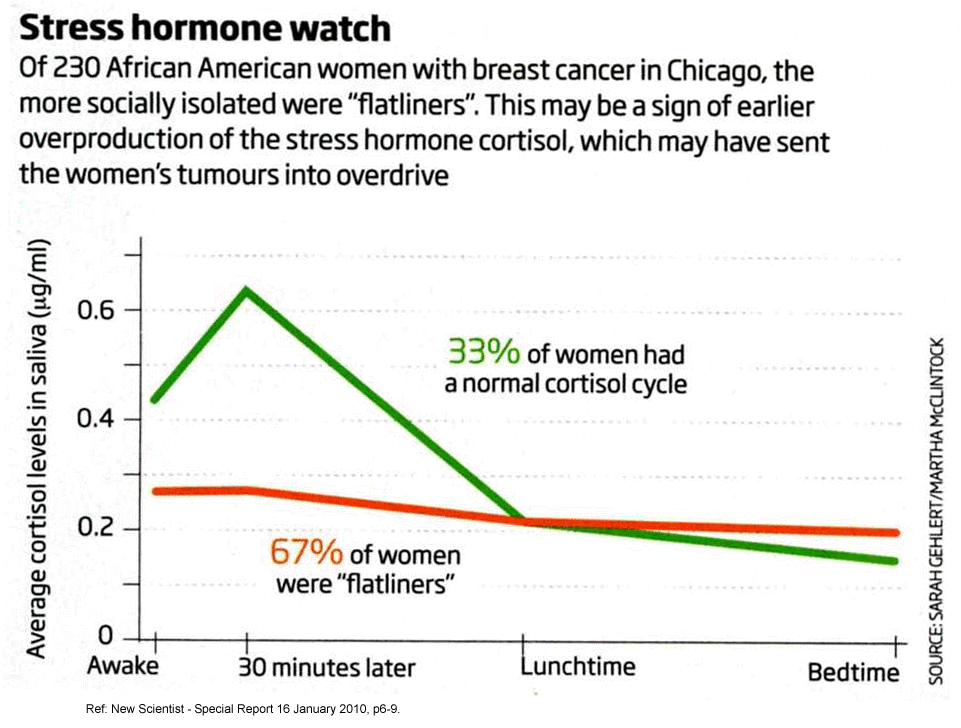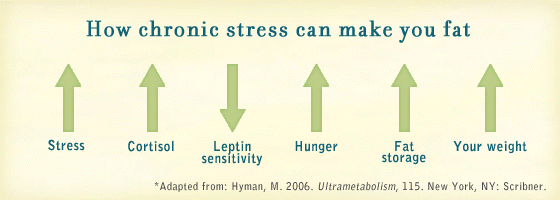Chronic
Stress Leads to Ill Health
|
|
Chronic stress is a
widespread problem in the world today leading to
chronically elevated cortisol, which is almost
always detrimental. The chronic stress
hormone cortisol has been called
a "psycho" toxin because of it's
ability to affect behaviour.
Cortisol is a potent
anti-inflammatory and insulin resisting hormone
which helps to control immune reactivity and
increase energy availability by increasing the
levels of glucose and fatty acids in the blood.
These adaptive changes can be extremely
beneficial when we need to temporarily increase
our performance to deal with stress. Ideally,
once the stressor has passed, cortisol level will
drop and our physiology will come back into
balance. If the stress is persistent, the level
of cortisol remains elevated as a compensatory
mechanism, however sustained elevated levels of
cortisol has an impact on many tissues ( see
below ) and sustained overproduction of cortisol
can also lead, over time, to a condition called
"corticol burnout". Recent
research has shown a significant association
between cortisol burnout and breast cancer in
women.

Chronic stress can also
make you fat! When your body is stressed
whether emotionally or physically or both it will
hoard calories mainly in the form of fat around
the abdomen. Also under the influence of the
stress hormone cortisol, our body becomes less
sensitive to leptin, the hormone that makes us
feel full, so we eat more than we normally would.
Since most people have a sedentary
lifestyle they do not burn the extra calories
while many live under a state of constant chronic
stress, operating under elevated cortisol levels
for long periods of time..... It is worse of
course if someone has a high carbohydrate diet.

IMMUNE SYSTEM: In
short time stress we see a shift towards Helper T
Cell 1 (TH1), however continuous secretion of
cortisol by the adrenal glands will cause a
Helper T cell 2 state (TH2) thus eventually
increasing the risk of allergies but also of
diseases that need the TH1 pathway to be
eliminated. These diseases include deep viral
infections such as Epstein Barr Virus,
Cytomegalovirus, fungal infection and even
cancer.
GASTRO-INTESTINAL: The
hypothalamic hormone, cortico-releasing hormone,
has receptors in the gut lining, thus causing an
increase in the permeability of the gut with the
resulting vicious cycles of allergy,
intoxication, liver overload and even systemic
disease which is triggered by antigens leaking
through the gut lining.
CARDIOVASCULAR DISEASE:
The role of cortisol in cardio-vascular disease
and metabolic syndrome is becoming clearer.
Central obesity is one of the metabolic action of
cortisol and insulin resistance is a natural sequel.
Cortisol, a catabolic hormone, also shares a
receptor with, for instance, the anabolic hormone
testosterone in the muscles. If cortisol is
constantly excreted at high levels over time, we
see a displacement of testosterone with resulting
muscle atrophy and underperformance.
NERVOUS SYSTEM: If
cortisol is secreted in too high and prolonged
fashion the brain suffers directly. Cortisol has
receptors in the brain which it shares with
aldosterone. The balance between the two hormones
is needed to lay down long term memory. If
cortisol displaces the aldosterone from its
receptor, this is not possible. Cortisol also has
an effect on the autonomic nervous system and
will increase the secretion of noradrenalin which
will give rise to palpitations, neurasthenia or ,
in other patients, to cardio-vascular disease.
DETOXIFICATION:
Cortisol plays a role in the natural degradation
and repair process of the extra-cellular matrix.
The diurnal rhythm of cortisol is especially
important here since cortisol production should
diminish at night when a slightly inflammatory
state will allow the removal of any diseased
tissue in the matrix and also the release of
toxins in the bloodstream for liver
detoxification and excretion. Insomnia and
overwork associated with chronic stress will
disturb the rhythm and keep cortisol secretion
elevated at night. The cleansing action in the
extra-cellular matrix cannot then take place
properly. If the degradation and repair of the
matrix is disturbed, we see a rigid, toxic matrix
which will prevent proper cell-to-cell
communication and matrix to cell communication.
This will result in cellular disease and
eventually dedifferentiation since toxins in the
extra-cellular matrix can disrupt the
intra-cellular matrix and even the intranuclear
matrix, so that disease can develop even if the
toxin is not directly in that location.
ENERGY PRODUCTION:
Cortisol may also have a direct effect on the
mitochondria so prolonged secretion can interfere
with energy ( ATP ) production at the cell level.
ORAL HEALTH:
Chronic stress can have an impact on oral hygiene
and diet as the chronically stressed individual
may start to neglect his oral hygiene and the
quality of his diet. Poor diet and oral hygiene
are well known causes of oral diseases. In
addition if the body is exposed to various oral
toxins from dental and periodontal infections,
heavy metals from restorative materials and other
chemicals, the impact of cortisol on the
extra-cellular matrix, as mentioned above, will
allow the gradual accumulation of these toxicants
in the body, a process called deposition and
impregnation in homotoxicology.
|

